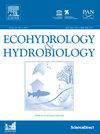对栖息在底流区的无脊椎动物进行文献计量分析:知识过于零散和偏颇?
IF 2.2
4区 环境科学与生态学
Q2 ECOLOGY
引用次数: 0
摘要
本研究探讨了有关栖息在水下带(HZ)的无脊椎动物的发表模式,该主题已被 Scopus 索引。然后,我们利用这篇综述从多个方面调查了科学文章的模式和偏差,如 2000 年至 2024 年 HZ 生态研究的时间进展、研究空缺的地理区域、采样河流、存在的基质类型、地点(国家和大陆)、方法技术和作者涉及的主要生态主题。我们发现,各大洲的 HZ 实地研究支离破碎,许多地理区域都没有 HZ 研究。此外,我们还发现在采样者的选择上存在不合理的倾向,而且缺乏国际采样规程。同样,我们注意到采样深度和过滤生物的网的大小尚未标准化,这使得不同研究和地区之间很难(甚至不可能)进行直接比较。最后,我们认为,在许多情况下,HZ 无脊椎动物群落的生态学知识仍以描述性和基础性为主。我们鼓励研究人员制定标准化的采样方案,扩大更多的 HZ 研究,覆盖空缺的地理区域,检验生态假设,并将这一群落用于应用生态学研究(如生物监测研究)。本文章由计算机程序翻译,如有差异,请以英文原文为准。
A bibliometric analysis of the invertebrates inhabiting the hyporheic zone: Too fragmented and biased knowledge?
This study explores the publishing patterns concerning invertebrates inhabiting the hyporheic zone (HZ), a topic indexed by Scopus. This review was then used to investigate the patterns and biases of scientific articles in multiple aspects such as the temporal progress of HZ-ecology studies from 2000 to 2024, geographical areas of research vacancy, sampled river, substrate type present, location (country and continent), methodological techniques and the main ecological themes addressed by authors. We detected that HZ field studies are fragmented across continents and absent in many geographical areas. Besides, we identified unjustified tendencies in the sampler selection and the lack of an international sampling protocol. In a similar way, we noticed that sampling depth and the net size to filter organisms are not normalized yet, making difficult (if not impossible) direct comparisons between different studies and regions. Finally, we suggest that the ecological knowledge of the HZ invertebrate community is still predominantly descriptive and basic in many cases. We encourage researchers to standardize a sampling protocol, to enlarge more HZ studies covering geographical areas of vacancy, to test ecological hypothesis and to use this community in applied ecology studies (ex. biomonitoring studies).
求助全文
通过发布文献求助,成功后即可免费获取论文全文。
去求助
来源期刊

Ecohydrology & Hydrobiology
Agricultural and Biological Sciences-Aquatic Science
CiteScore
5.40
自引率
3.80%
发文量
51
期刊介绍:
Ecohydrology & Hydrobiology is an international journal that aims to advance ecohydrology as the study of the interplay between ecological and hydrological processes from molecular to river basin scales, and to promote its implementation as an integrative management tool to harmonize societal needs with biosphere potential.
 求助内容:
求助内容: 应助结果提醒方式:
应助结果提醒方式:


